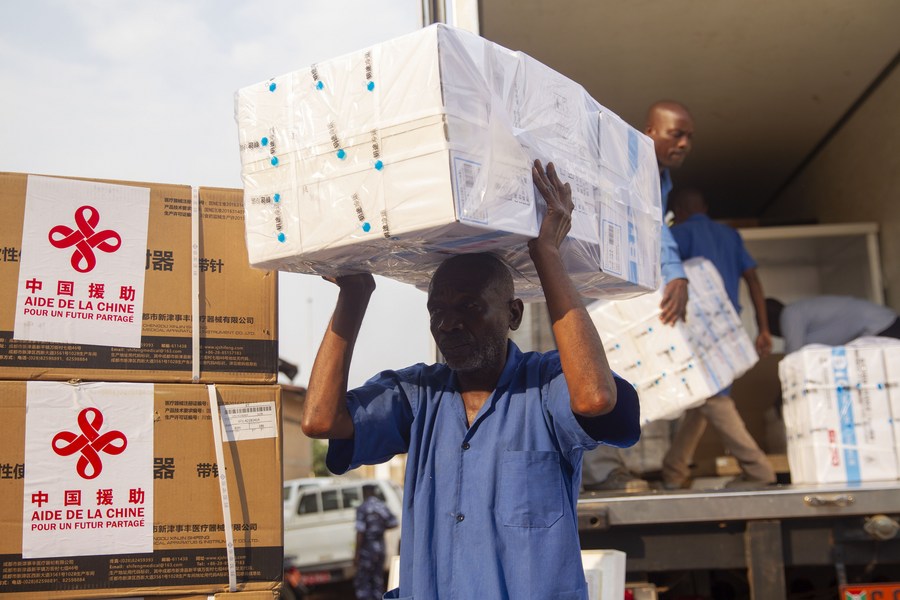APEC can play bigger role for brighter shared future

Aerial photo taken on Jan. 14, 2021 shows the container terminal of the Lianyungang Port in Lianyungang City, east China's Jiangsu Province. (Photo by Geng Yuhe/Xinhua)
The Asia-Pacific has all along been an important engine driving the global economy. Along the bumpy and foggy road ahead, China is ready to work closely with other members of the region and wider world in guiding the global community out of the woods and building a brighter shared future.
BEIJING, Nov. 11 (Xinhua) -- As leaders of the Asia-Pacific Economic Cooperation (APEC) members are meeting via video link during the 2021 APEC Economic Leaders' Week, they are facing a torrent of pressing challenges like the raging pandemic, a continued unbalanced global economic recovery and a warming planet.
There is a number of reasons to have faith in a more united and resilient APEC. For more than once, by acting in solidarity, members of the bloc have played a key role in anchoring regional and global stability at critical moments like the 1997 financial crisis, the 2003 SARS outbreak, and the 2008 global financial crisis.
The task this time is even more challenging, and APEC members can and should play a more important role.
Containing the still raging COVID-19 pandemic remains the first imperative. While many countries have been pressing ahead with vaccinating their nationals, the number of infections and deaths from this deadly disease is still multiplying. Unfair distribution of vaccines, cunning virus variants, and vaccine hesitancy have all added to the uncertainty looming over the global fight against COVID-19.

A worker conveys China-aided COVID-19 vaccines at an airport in Bujumbura, Burundi, Oct. 14, 2021. (Photo by Evrard Ngendakumana/Xinhua)
To clinch the final victory in this life-and-death battle, APEC members must stick to greater solidarity and closer cooperation, work to ensure the vaccines are fairly accessible and affordable especially in underdeveloped countries, and step up cooperation in areas such as testing methods, medical treatment and related research, development, production and mutual recognition of vaccines to truly create synergy against COVID-19.
Strengthening the opening-up and economic integration of the region is another priority. Over the past decades, based on mutual trust, inclusiveness and win-win cooperation, the Asia-Pacific region has succeeded in sustaining fast development for a fairly long period of time.
To ensure resilience in the region, APEC members should promote the liberalization and facilitation of trade and investment, keep industrial and supply chains stable and functioning, and promote the orderly flow of resources and inputs to boost economic recovery and achieve interconnected development.
Recently, the Regional Comprehensive Economic Partnership agreement has crossed the ratification threshold to enter into force in January 2022. That is a hard-won triumph for multilateralism and regional integration in this age of rising protectionism and economic nationalism.

People select goods at the 18th China-ASEAN Expo in Nanning, capital of south China's Guangxi Zhuang Autonomous Region, Sept. 11, 2021. (Xinhua/Lu Boan)
China in recent days has applied to join the Comprehensive and Progressive Agreement for Trans-Pacific Partnership and the Digital Economy Partnership Agreement, demonstrating Beijing's determination to push forward the economic integration of the region.
It is worth noticing that while most APEC members are committed to bringing the region closer together, and putting aside differences to jointly meet common challenges, some narrow-minded members of the bloc are still bent on retaining barriers and forming political cliques in pursuit of selfish interests. Those moves risk squandering APEC's decades of efforts to promote regional integration.
If history is any indication, attempts to draw ideological lines or form small political circles on geopolitical grounds are bound to fail. The Asia-Pacific region cannot and should not relapse into the confrontation and division of the Cold War era.
Promoting green and innovative development should also be ranked high on the agenda. The COVID-19 pandemic stands as a stark reminder that all people, whether rich or poor, socialist or capitalist, share one same home planet, and no country can emerge unscathed from common challenges like climate change. Only by uniting to follow a green development path, can humanity achieve sustainable development.
Innovation is an important force driving human progress. APEC members need to speed up scientific and technological innovation and institutional innovation, promote the commercialization of scientific and technological advances, and foster new drivers of growth so that innovation will boost both economic development and green transition.
As APEC has grown to become a dynamic engine of the global economy and one of the most important regional forums in the Asia-Pacific, China has played an increasingly relevant and significant role since its accession to the regional agreement in 1991.

People buy products while visiting the "CIIE Fair" on the Nanjing Road pedestrian walkway in Shanghai, east China, Nov. 8, 2021. (Xinhua/Fang Zhe)
Over the past three decades, China, as an active APEC member, has made tremendous contributions to promoting economic integration in the region, and played a pioneering role in supporting multilateralism and boosting sustainable development.
At the moment, it is still unclear when the world can vanquish the ongoing pandemic, and the road to a more solid global economic recovery looks arduous. Yet the global community has no other option than to embark on these missions.
The Asia-Pacific has all along been an important engine driving the global economy. Along the bumpy and foggy road ahead, China is ready to work closely with other members of the region and wider world in guiding the global community out of the woods and building a brighter shared future.
Photos
Related Stories
- Xi's speech at APEC summit injects new momentum into building Asia-Pacific community with shared future
- China will create greater opportunities for Asia-Pacific region: Xi
- Full Text: Keynote speech by Chinese President Xi Jinping at APEC CEO Summit
- Xi urges Asia-Pacific to stride toward community with shared future
- Xi to attend APEC Economic Leaders' Meeting
Copyright © 2021 People's Daily Online. All Rights Reserved.










